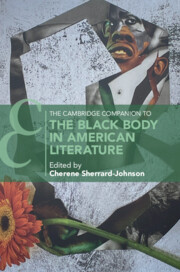Book contents
- Frontmatter
- Contents
- Figures
- Notes on Contributors
- Acknowledgments
- Celestial Bodies
- Part I Extraction and Abstraction
- Part II Black Optics
- 7 Synesthetic Embodiment
- 8 Dancing Bodies
- 9 Celebrity Bodies
- 10 Embodied Black Aliveness
- 11 Staging Racial Passing
- 12 Passing Bodies
- Part III Quare Bodies
- Notes
- Bibliography
- Index
- Cambridge Companions To …
8 - Dancing Bodies
from Part II - Black Optics
Published online by Cambridge University Press: 09 May 2024
- Frontmatter
- Contents
- Figures
- Notes on Contributors
- Acknowledgments
- Celestial Bodies
- Part I Extraction and Abstraction
- Part II Black Optics
- 7 Synesthetic Embodiment
- 8 Dancing Bodies
- 9 Celebrity Bodies
- 10 Embodied Black Aliveness
- 11 Staging Racial Passing
- 12 Passing Bodies
- Part III Quare Bodies
- Notes
- Bibliography
- Index
- Cambridge Companions To …
Summary
New Negro writers and artists often spotlighted the contrast between the liberatory potential of dynamic bodily movement and the restricted social spaces of Harlem, which were shaped by segregation. This chapter examines a variety of cultural texts – social and cultural history by Wallace Thurman and James Weldon Johnson, visual art by Winold Reiss, and short fiction by Rudolph Fisher and Langston Hughes – to argue that representations of dance and bodily movement opened the way for creative engagement with the spatial dynamics of segregation and overcrowding in Harlem, which was fascinated by the look, the sound, and the feel of dance. Fisher’s short story “High Yaller,” for instance, probes the affective or subjective dimensions of segregation, passing, and colorism through a sustained focus on dancing bodies in “jim-crowed” scenes of Harlem cabaret and the traversing of “color lines” in the cityscape of New York.
Keywords
- Type
- Chapter
- Information
- The Cambridge Companion to the Black Body in American Literature , pp. 114 - 127Publisher: Cambridge University PressPrint publication year: 2024

